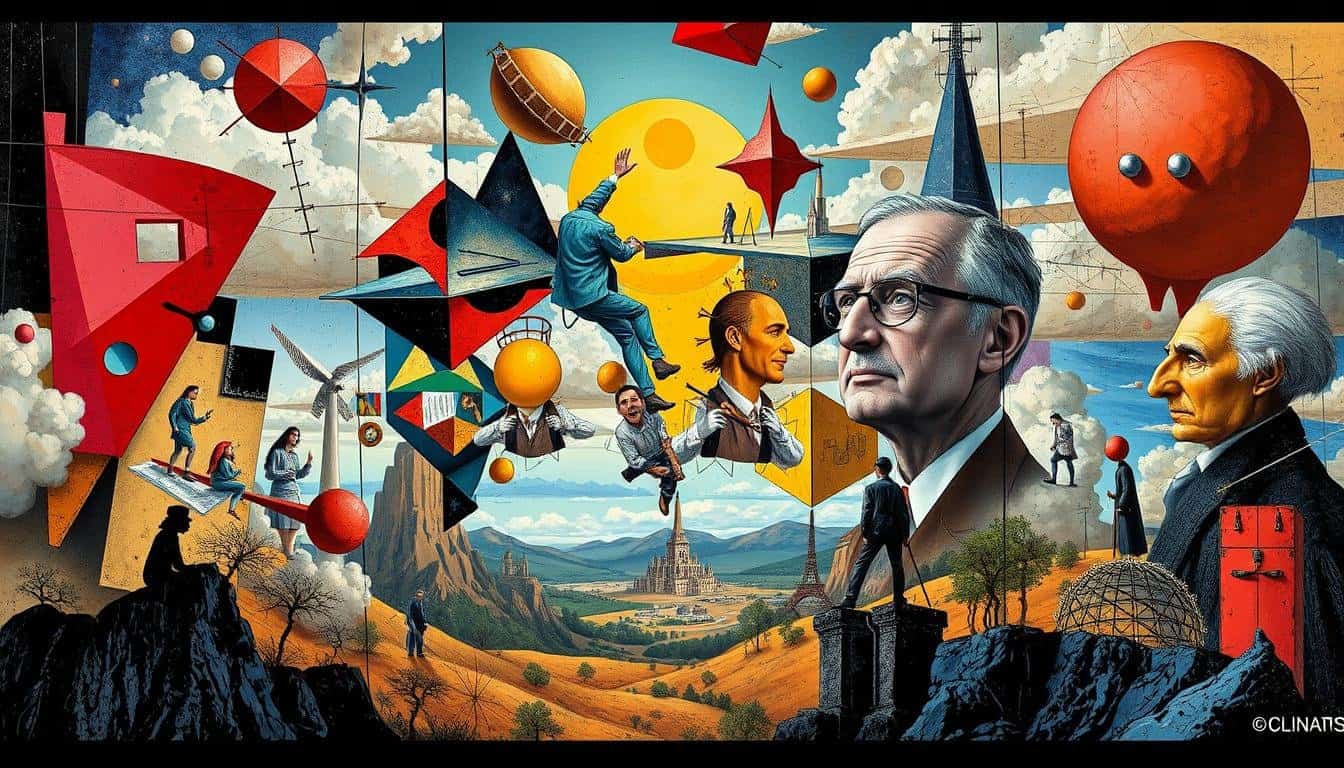Postmodern Philosophy: Key Themes and Critics
Have you ever thought about the truth in our world today? Postmodern philosophy takes us on a journey away from the old ideas of Enlightenment rationality. It questions the idea of objective truths and scientific facts. This movement is a reaction against the certainties of modernism.
It brings up important themes and thinkers who look at how meanings change, the power of language, and the existence of big stories. This article will explore the main ideas of postmodern thought. It will also talk about the important criticisms that shape our discussions today.
Key Takeaways
- Postmodernism challenges the old ideas of human progress and rational control.
- It focuses on questioning reality, the power of language, and the critique of big stories.
- Thinkers like Jacques Derrida and Michel Foucault have greatly influenced postmodern thought.
- Postmodern philosophy is known for its skepticism and relativism, especially about truth and objectivity.
- It makes us think about power and social structures that shape our knowledge and reality.
Understanding Postmodernism
Postmodernism is a big change in contemporary thought. It started in 1979 with Jean-François Lyotard’s book, The Postmodern Condition. This movement questions big stories from the Enlightenment era. It doubts our beliefs about reality and universal truths.
At its core, postmodernism talks about itself. Critics like Habermas point out its contradictions. Supporters question ideas like freedom, subjectivity, and creativity. They aim to break them down.
Nihilism, inspired by Nietzsche, has also influenced postmodern thought. It challenges our understanding of the self.
Some say postmodernism is hard to understand or lacks clear definitions. Others worry it leads to relativism because it rejects big stories. These cultural reflections show how it can both free and confuse our discussions today.
Scholars keep debating postmodernism. Their discussions show the movement’s complexity and its many meanings in contemporary thought.
Key Themes in Postmodern Philosophy
Postmodern philosophy brings new ideas to the table, changing how we think about knowledge and truth. It challenges big stories that claim to have all the answers. Instead, it says knowledge depends on where we are and our cultural background.
At the heart of this idea is the power of personal stories. Postmodern thought says our own stories and experiences matter a lot. This leads to many different meanings and ways of seeing things. It makes us think about how power affects what we talk about and understand.
Language is another big theme. Postmodern thinkers see language as more than just a way to share ideas. It shapes our view of the world. Because words can mean different things to different people, understanding language helps us see the complexity of life.
This way of thinking questions big truths and pushes for a more open conversation. It challenges old norms and makes us think differently. These ideas in postmodern philosophy encourage us to look closely at how we learn and move forward together.
Critique of Metanarratives
Postmodern philosophy is big on questioning big stories that try to explain everything. These big stories often hide the diversity of human experiences and quiet the voices of the marginalized. It’s key to understand these big stories to see what this philosophy is all about.
What is a Metanarrative?
Metanarratives are big theories that aim to explain everything from history to social trends to culture. They claim to have the one truth or ideology that helps us make sense of our complex lives. But, postmodern thinkers say these stories can’t handle the many ways people see the world.
Examples of Critiqued Metanarratives
Here are some examples of how postmodern thought challenges big stories:
| Metanarrative | Description | Critique |
|---|---|---|
| Marxism | A socioeconomic framework asserting the inevitability of class struggle and economic progression. | Considered reductive, failing to capture the nuances of individual experiences and cultural variations. |
| Christian Narrative | The belief in a divine plan for humanity governed by moral truths. | Seen as exclusionary, often dismissing alternative spiritual or secular perspectives. |
| Enlightenment Progress | The notion that human history is a linear journey towards rationality and improvement. | Criticized for ignoring regression, conflict, and the diverse paths taken by different cultures. |
These examples show the flaws in big stories, as seen by postmodern thought. This movement pushes us to look closer at our own stories and the cultures we come from. It’s all about valuing personal truths and sparking a conversation about what reality really is.
The Role of Language and Text
In postmodern philosophy, language is key to challenging old ideas about meaning and how we see the world. It’s seen not just as a way to talk but as a text as construct that shapes our view of reality. This view shows how language affects culture and society.
Language as Construct
Language is a social creation that shapes how we see truth and power. It means texts can have different meanings, depending on the context. This idea shows how language changes how we communicate and connects words to the world around us.
The Influence of Derrida’s Deconstruction
Derrida’s deconstruction idea is vital for understanding how texts mean things. It says language can’t always point to a clear truth. This opens up new ways to think about meaning and its fluidity. It makes us question our stories and the beliefs they carry.
Through deconstruction, we can see how language affects who we are, our citizenship, and what we believe in different situations.
| Year | Publications |
|---|---|
| 2000 | 1 |
| 2010 | 1 |
| 2020 | 4 |
| 2021 | 1 |
| 2022 | 1 |
| 2023 | 2 |
Poststructuralism and Its Impact
Poststructuralism started in the 1980s and changed the way we think about human behavior and culture. It challenges the idea that we can fully understand these things using fixed structures. Thinkers like Jacques Derrida showed that meaning comes from many social and cultural factors, not just one definition.
Many thinkers have shaped poststructuralism. Claude Lévi-Strauss, in the early 1960s, set the stage with structuralism. Then, Derrida’s deconstruction in 1967 pointed out the flaws in old systems of thought. This showed the movement’s main ideas.
Works like Anti-Oedipus by Deleuze and Guattari mixed Marxist and Freudian ideas. This led to new ways of thinking about culture and challenged big ideas like Truth and Reality. Friedrich Nietzsche’s ideas also played a big role, pushing for a view that truth is relative.
By the 1970s, doubts about Marxism made postmodern thought more popular. But, some critics worried that poststructuralism could lead to conservative or selfish views. Today, thinkers are looking at how these ideas can help us understand human rights and ethics.
| Key Concepts | Philosophers | Influence |
|---|---|---|
| Relativism | Friedrich Nietzsche | Challenges fixed truths |
| Deconstruction | Jacques Derrida | Critiques contradictions |
| Cultural Shift | Deleuze and Guattari | Questions absolutes |
| Critical Theory | Claude Lévi-Strauss | Foundation for poststructuralism |
Poststructuralism has changed many fields, like literature and sociology. It teaches us to look at things in a more detailed way. It shows how important context is and how different cultures can see things in many ways. This has big effects on how we understand people and their experiences.
Philosophical Critiques of Postmodernism
Postmodernism has faced many critiques, with skepticism leading the charge. Critics say it lacks a clear definition and meaning. This vagueness makes it hard for scholars to discuss it clearly.
General Skepticism and Relativism
Some argue that postmodernism questions the idea of objective knowledge. They say it leans too much on relativism. This could lead to a lack of ethics, even nihilism. Jürgen Habermas points out that postmodernism uses modern ideas to criticize modernity.
Richard Dawkins also notes that postmodern texts often use hard-to-understand language. This makes it harder to grasp their ideas, leading to calls for simpler language in debates.
Opposition from Analytic Philosophers
Analytic philosophers strongly disagree with postmodernism. They value clarity and rigor in philosophy. They see postmodernism as unclear and even self-contradictory, making deep discussions hard.
They worry that rejecting universal truths can lead to harmful beliefs. This debate highlights the tension between skepticism and clear thinking. The growth of artistic freedom in postmodernism adds to the complexity, challenging philosophers to find meaning in our changing world.
| Critic | Key Critique |
|---|---|
| Jürgen Habermas | Critiques postmodernism for self-reference, arguing it relies on modern concepts. |
| Richard Dawkins | Condemns the lack of content and use of obscure language in postmodern works. |
| General Critics | Accuse postmodernism of relativism, leading to support for far-right ideologies. |
Influential Thinkers in Postmodern Philosophy
Many thinkers have shaped postmodern philosophy. They bring new ideas that question old beliefs. Jacques Derrida, Michel Foucault, and Jean-François Lyotard are key figures. They offer insights on truth, meaning, and how we see the world.
Jacques Derrida
Jacques Derrida is a big name in postmodern thought. He’s known for deconstruction, which looks at texts for contradictions. This shows how meaning is made, not given.
Derrida says language and culture shape how we understand things. His ideas have changed how we think about literature and philosophy. He makes us question what we mean by meaning.
Michel Foucault
Michel Foucault studied power and knowledge. He showed how society’s truths come from discourses. Knowledge is linked to power, not just facts.
Foucault challenged old ways of thinking. He made us see how norms shape our view of reality. His work talks about the fluidity of truth and the importance of history.
Jean-François Lyotard
Jean-François Lyotard is known for questioning grand narratives in postmodern philosophy. He believes these narratives oversimplify human experiences. He values diversity in understanding human society.
His book, “The Postmodern Condition,” is key to understanding postmodern skepticism. It challenges the idea of a single, universal truth.
| Thinker | Major Contribution | Key Concepts |
|---|---|---|
| Jacques Derrida | Deconstruction | Meaning, Interpretation, Language |
| Michel Foucault | Power and Knowledge | Discourse, Truth, Historical Context |
| Jean-François Lyotard | Critique of Grand Narratives | Pluralism, Skepticism, Meaning |
Contemporary Thought and Postmodernism
The postmodernism legacy deeply affects today’s thought in many areas. It touches literature, art, and cultural studies. Postmodern ideas about breaking things down and questioning big stories are still big in our world. They fit well with our globalized and diverse lives, where old ideas don’t always work.
Postmodernism’s complex and unclear nature makes us think more deeply about life and what we know. It makes us see the world in a richer way.
The Legacy of Postmodernism in Modern Discourse
Many students today grew up in a world shaped by the past. The books and texts they study in British postmodernism classes might seem old-fashioned. They don’t match up with today’s culture, which has moved on from traditional postmodern styles.
Now, we see postmodern ideas in things like kids’ cartoons like “Shrek” and “The Incredibles.” These shows show how postmodern themes are still around in our entertainment.
Today, we’re moving towards what’s called ‘pseudo-modernism.’ This brings more culture to the people, making us both fans and creators. Thanks to the internet, movies and games are more interactive now. This changes how stories are told and how we experience them.
But, philosophers are still dealing with the big questions postmodernism brings up. They’re trying to figure out what truth and knowledge mean anymore. This shows that postmodernism has really changed the way we think about these things.
Source Links
- Postmodernism and Its Critics
- Postmodernism | Definition, Doctrines, & Facts
- Postmodern philosophy
- Postmodernism
- Criticism of postmodernism
- Lyotard, Jean-François | Internet Encyclopedia of Philosophy
- From Postmodernism to Metamodernism | Issue 162
- Literary Analysis, Part 3: Metanarrative
- Postmodernism Paradigm and its View on the Existence of Language
- Jean François Lyotard
- Postmodern Philosophy and the Problem of Language
- A Gentle Introduction to Structuralism, Postmodernism And All That | Issue 10
- No title found
- 10.5 POSTMODERN AND POSTSTRUCTIONAL THEORY
- Postmodernism | Tate
- An Introduction to Postmodernist Thinkers & Themes: Watch Primers on Foucault, Nietzsche, Derrida, Deleuze & More
- Postmodern philosophy
- What is Postmodernism?
- The Death of Postmodernism And Beyond | Issue 58
- Truth, Contemporary Philosophy, and the Postmodern Turn







